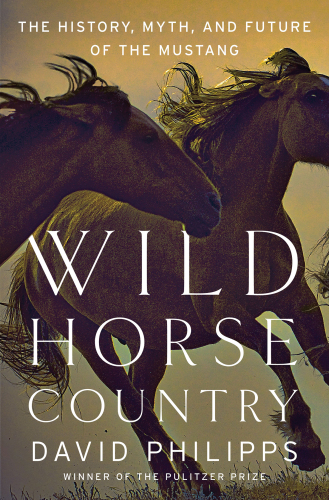
Wild Horse Country
The History, Myth, and Future of the Mustang, America's Horse
کتاب های مرتبط
- اطلاعات
- نقد و بررسی
- دیدگاه کاربران
نقد و بررسی

July 17, 2017
Pulitzer Prize–winning reporter Philipps (Lethal Warriors) investigates the history and current status of America’s wild-horse herds, beginning in the 16th century with the mustang’s introduction into the Americas by the Spanish conquistadors and ending with a rumination on how best to humanely limit the ever-expanding mustang population today. Along the way, Philipps examines the mustang’s near extinction due to the rise of meat factories at the turn of the 20th century and a remarkably successful political movement organized by Velma Johnson (aka Wild Horse Annie), who embarked on a campaign that led to the passage of federal protections for mustangs. There is something to learn from the erudite Philipps on almost every page as he describes the role of the mustang in the myth of the West, the evolution of prehistoric horses, and many other relevant subjects with equal facility. Philipps also ably analyzes the complex forces at play in the ongoing fight between conservationists working to protect free-range mustangs, ranchers protective of their grazing rights, and the Bureau of Land Management, which is charged with maintaining mustang herds. If there is a villain in his tale, it is the BLM, depicted as an ineffective bureaucracy at best and at worst as a corrupt entity complicit in the illegal selling of mustangs to rendering factories. Philipps’s strengths are on full display in this thoughtful, balanced, and informative work. Illus.

May 1, 2017
It says something when a Pulitzer Prize-winning national reporter for the New York Times tackles a subject, and the mustang represents the fault line between managed and unmanaged that defines America today, with ranchers, scientists, animal rights activists, slaughterhouse employees, and government officials all arguing over what to do about these hoof-stomping, mane-shaking beauties. With wild horses also defining America's history and mythology, this book is good reading for just about everyone.
Copyright 2017 Library Journal, LLC Used with permission.

August 15, 2017
A gimlet-eyed look at the place of the wild horse in the landscape of the American West and at the poor legacy of human relations with that spirited animal.If you do not live in the mountain West, you might not know that a fierce controversy rages over wild horses, or mustangs, on public lands and whether they should be removed and, in some cases, exterminated. Ranchers, as Colorado-based New York Times reporter Philipps (Lethal Warriors: When the New Band of Brothers Came Home, 2010) writes, are vocal in their hatred of both the federal agencies in charge of those lands and of the wild horses: "Mention mustangs in almost any small-town bar or cafe and prepare for an earful." Lifting the argument a notch or two above where it usually rests, the author examines the natural history of these wild creatures--feral, their ancestors long-ago domesticated horses that escaped and formed their own herds--writing that while they may look a little scruffy, they are prized for intelligence and stamina: "The desert prunes any deficiencies." Traveling through mustang country, Philipps considers a long history of mismanagement on the part of the federal government, based on rather haphazard roundups for most of the last half-century, with halfhearted efforts at adoption. When left to their own devices, ranchers have followed a program of trapping wild horses, selecting the best to incorporate into their herds, and then--well, one Nevada rancher tells the author, "we would chicken feed whatever nobody wanted." Philipps proposes that we recognize the mustang, as with other wild species, as an animal that has a people problem, not the other way around, adding that some of the old saws about mustangs are inaccurate: it's not true, for instance, that they lack natural predators, since mountain lions are vigorous in culling the herd. A fine, readable work of advocacy journalism, of a piece with Marc Reisner's Cadillac Desert, that deserves to inform discussion about the mustang issue as it plays out in courts and in Congress.
COPYRIGHT(2017) Kirkus Reviews, ALL RIGHTS RESERVED.

























دیدگاه کاربران